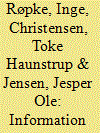|
|
|
Sort Order |
|
|
|
Items / Page
|
|
|
|
|
|
|
| Srl | Item |
| 1 |
ID:
094854


|
|
|
|
|
| Publication |
2010.
|
| Summary/Abstract |
Information and communication technologies (ICTs) increasingly permeate everyday life in industrialized societies. The aim of this paper is to explore ICT-related transformations of everyday practices and discuss the implications, particularly for residential electricity consumption. The present socio-technical changes are seen in a historical perspective, and it is argued that the integration of ICT into everyday practices can be seen as a new round of household electrification, comparable to earlier rounds that also led to higher electricity consumption. A case study carried out in Denmark in 2007-2008 explores the present changes in everyday life. Based on qualitative interviews, the study focuses on people's ways of integrating ICTs into their everyday practices, on any significant changes in these practices, and on the influence of the changed practices on electricity consumption. The paper concludes with a discussion on the implications for energy policy.
|
|
|
|
|
|
|
|
|
|
|
|
|
|
|
|
| 2 |
ID:
171439


|
|
|
|
|
| Summary/Abstract |
The paper discusses the dynamics behind price-based incentives in demand response programmes promoting time shifting of energy consumption in households. Through a comparative analysis of smart energy pilots in Norway, Austria, and Denmark, the study shows that economic incentives under certain conditions influence energy-consuming practices of households but not in ways anticipated by widespread rational conceptualisations within economic, engineering, and policy-making approaches. The paper elaborates the practice-theoretical understanding of financial structures in smart energy interventions and identifies the socio-material configurations causing price to play a role. This informs policymakers and developers of future smart energy interventions. The overall policy recommendation of the paper is that smart energy designers, planners, and policymakers need to consider the complexity of interrelated elements that co-determine the effectiveness of price incentives. Thus, a successful coupling between price incentives and demand response actions can best be realised via a productive mixture of mutually supporting elements (engagements, devices, and competences). In addition, the paper provides specific recommendations related to the design of effective and workable price schemes that fit into the everyday lives of households.
|
|
|
|
|
|
|
|
|
|
|
|
|
|
|
|
|
|
|
|
|